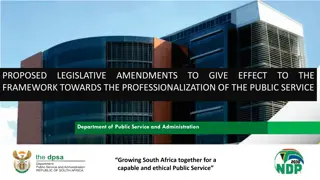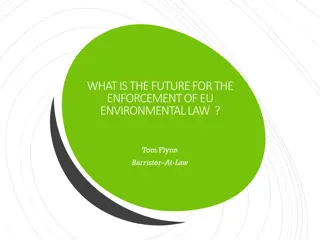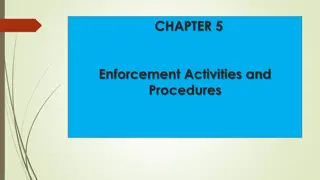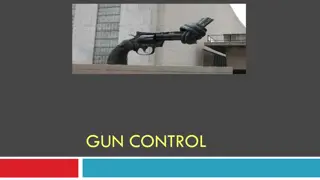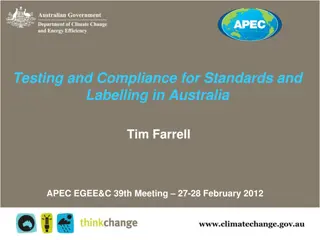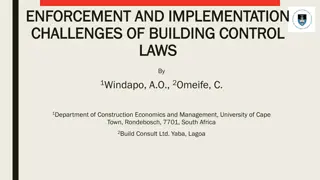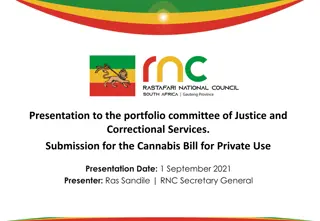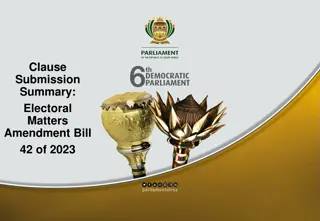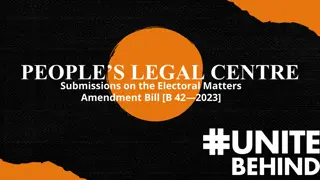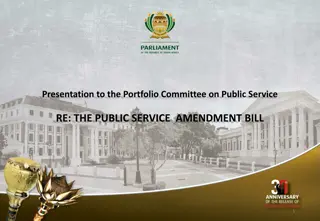National Environmental Management Laws Amendment Bill: Compliance and Enforcement Responses
The National Environmental Management Laws Amendment Bill includes revisions related to definitions, consequences of unlawful activity commencement, and more. Stakeholders have provided feedback on aspects such as consistency in terminology usage, inclusion of definitions aligned with existing acts, and provisions for public participation in processes. Disagreements exist regarding the abolishment of certain clauses and the scope of authorization applications. The bill aims to address compliance and enforcement issues in environmental management.
Download Presentation

Please find below an Image/Link to download the presentation.
The content on the website is provided AS IS for your information and personal use only. It may not be sold, licensed, or shared on other websites without obtaining consent from the author. Download presentation by click this link. If you encounter any issues during the download, it is possible that the publisher has removed the file from their server.
E N D
Presentation Transcript
NATIONAL ENVIRONMENTAL MANAGEMENT LAWS AMENDMENT BILL (Compliance and Enforcement Responses) PORTFOLIO COMMITTEE ON ENVIRONMENTAL AFFAIRS 1
NEMA Section 1: Definitions Cla use From Comment/ proposal Response 1 Centre for Environme ntal Rights The term environmental mineral and petroleum inspector (EMPI) must be used consistently throughout the entire Bill Supported: Amendment consistent throughout review Bill of for use EMPI 1 Chamber of Mines Insert the definition of a municipality, municipal manager and municipal council that is aligned to the Municipal Systems Act, 2000 Supported: DG and HOD are defined, therefore insert the definition of municipal manager municipal council ito the MSA municipality, and 1 Chamber of Mines Define the term Minister responsible for Water Affairs Not supported: the term Minister is defined to clarify that it means Minister of EA, however, this term is self explanatory 2
NEMA Section 24G: Consequences of unlawful commencement of activity Cla use From Comment/ proposal Response Centre for Environme ntal Rights S24G should be abolished as it provides a perverse incentive for persons that commenced unlawfully to obtain an authorization after the fact, as a faster and cheaper way to obtain an environmental authorization. Not supported: Aimed at encouraging a greater number of contraveners to fall under the regulatory framework of Chapter 5 and EIA Regulations; Applies prospectively from date of granting of EA: can still be criminally liable for period of illegality (not rectification); S24G Fining Regulations have been promulgated to deter repeat contraveners: maximum fine of R5million recommended; Reviewed by the feasibility study into administrative penalties 5 S24G process should make explicit provision for public participation in the S24G process Not supported: Legislation already makes provision for public participation: - S24G directive to compile a report that includes a description of public participation; and - S24G Fine Regulations requires a preliminary advert giving advance notice of the submission of an application for I&Aps to register. 3
NEMA Section 24G: Consequences of unlawful commencement of activity Cla use From Comment/ proposal Response 5 Chamber of Mines The expansion of the persons allowed to apply for a S24G authorization to include successors-in-title or persons in control of is flawed; as it should only be made available to persons that unlawfully commenced no legal justification for requiring a successors- in-title or persons in control of to submit an application. Not supported: S24G application is a voluntary process: environmental authorities cannot direct a person to apply; Hybrid of a carrot (chance to obtain an ex-post facto authorization) and a stick (administrative fine); Although successors-in-title persons in control of, may be considered innocent, they should, in principle not be allowed a free benefit from the unlawful conduct of the predecessor; In terms of Regulations, they are able to make representations committee that their fine be reduced on the basis of their lack of fault. or If included, these categories of persons are potentially without fault, therefore they should be subject to a zero fine the S24G Fining to the fining 4
NEMA Section 24G: Consequences of unlawful commencement of activity Clau se From Comment/ proposal Response Transnet Transnet is a landowner on vast tracts of land that are not monitored or secured concerned that the expansion to successors in title; and persons in control of, will expand their risk. Not supported: The expansion of the category of persons allowed to apply will, in fact, lessen the risk of Transnet as the landowner; and there will be an opportunity for successors in title; and persons in control to regularise their unlawful activities. In such cases, they will be the applicants and liable to the payment of the administrative fine; and not Transnet (as the landowner) 5 Association of Cementitio us Material Products S24G applicants should be confined to those that committed an offence i.e. those that unlawfully commenced and not successors in title; and persons in control of. Not supported: Aimed at encouraging a greater number of contraveners to fall under the regulatory framework of Chapter 5 and EIA Regulations; Without this mechanism, a purchaser of property on which an activity was unlawfully commenced would never be able to regularise the infrastructure no land-use planning, building authorisation, insurance etc. Only a court can determine someone an offender through a criminal trial process. 5 5
NEMA S28: Duty of Care and remediation of environmental damage Clause From Comment/ proposal Response Centre for Environ mental Rights/C ommissi on for Gender Equality Require the DG,HOD or municipal manager to give advance notice of a directive to the recipient as well and other impacted or affected persons; and allow such persons a reasonable opportunity to make representations. Not supported: Purpose of S28 is to provide environmental authorities with an effective, streamlined enforcement mechanism to tackle significant environmental harm, with still complying with principle of administrative justice; Audi alteram partem rule requires only that the person whose rights may be directly adversely affected must be given a chance to make representations i.e. the recipient. 11 In the event that the recipient of a S28 directive fails to comply with the directive, allow an interested and affected party to undertake the remedial action; and recover the costs incurred. Only the those environmental authorities empowered to issue the S28 directive should be provided with the follow-on powers to undertake the necessary remedial action and recover the costs from those responsible for the pollution/degradation not the role of I&Aps. 6
NEMA S28: Duty of Care and remediation of environmental damage Clause From Comment/ proposal Response Chamber of Mines/ Banking Associati on of South Africa In relation to the category of persons upon whom a section 28(4) directive may be served, refer specifically to the category of responsible persons in 28(2), rather than the ambiguous term of any other person of whom the duty of care exists. Supported: For the purposes of clarity and certainty, it is preferable to include a cross reference in 28(4) to 28(2) rather than refer to any other person to whom the duty of care applies; This would make it clear that a directive may be issued to: an owner of land or premises, a person in control of land or premises or a person who has a right to use the land or premises on which or in which (a) any activity or process is or was performed or undertaken or (b) any other situation exists, which causes, has caused or is likely to cause significant pollution or degradation of the environment. 11 Chamber of Mines The word advanced notice in writing i.e. a S28 pre-directive, should be aligned to ss3(2)(b)(a) of PAJA and be replaced by adequate notice, which is a broader term. Supported: PAJA that requires that In order to give effect to the right to procedurally fair administrative action, an administrator, subject to subsection (4), must give a person referred to in subsection (1)-(i) adequate notice 11 7
NEMA S28: Duty of Care and remediation of environmental damage Clause From Comment/ proposal Response Chamber of Mines The Bill seeks to replace proportional liability with joint and several liability in the event that the environmental authorities are required to undertake reasonable remedial measures themselves. Supported: Section 28(8) of NEMA sets out the categories of persons against whom environmental authorities may claim/recover costs for reasonable remedial measures and includes a person responsible for the pollution, degradation; the owner of land (or their successor in title), person in control of land; person who has a right to use land; and a person that negligently failed to prevent the activity, process or situation. Due to the fact that the liability under s28(8) is fault-based , it is fair and reasonable to hold the category of persons liable on a proportional basis, depending on their degree of fault in causing the pollution or degradation, rather than on a joint and several basis. However, this still leaves environmental authorities with a complex and potentially costly duty to determine the degree to which each responsible person is liable for their respective failures to take reasonable measures this issue will further be explored in the NEMA/SEMA alignment process. 11 Joint and several liability would constitute expropriation of money within the Constitution, for which the State would have to pay compensation . This principle is not in accordance with the adoption of causality, on which the statutory duty of care is premised. Proportionality is inherent to the concept of causality on which the statutory duty of care is premised. 8
NEMA S28: Duty of Care and remediation of environmental damage From Comment/ proposal Clause Response Transnet /Busines s Unity of South Africa The addition of a municipal manager to the DGs and HODs that are empowered to issue S28 directives is inappropriate, due to the fact that municipalities under compliance and enforcement through their own bylaws. Not Supported: The implementation of national environmental legislation, namely NEMA and the SEMAs, is a shared competence between national, provincial and local authorities. A prime example of a function that is executed by local authorities is the implementation of the Air Emission Licensing system in terms of NEM:AQA, in terms of permitting, compliance and enforcement. This is an original duty allocated to local authorities in terms of Parts B of Schedules 4 and 5 of the Constitution. In addition, there is already a similar administrative enforcement mechanism provided to the Minister, provincial and local authorities existing in the statute books under section 31A of ECA, however, this is an outdated piece of legislation; and the enforcement mechanisms available to local authorities to enforce national environmental legislation needs to be aligned to those available to national and provincial for the sake of consistency. 11 The expansion of the environmental authorities to local authorities is of concern and may lead to the duty of care provisions being enforced by more than one regulator. This expansion would have unforeseen consequences in relation to exhausting internal remedies and potentially conflicting decisions, since the MSA provides for appeals against decisions by municipal officials. 9
NEMA S31BB: Designation of EMPIs by Minister of Mineral Resources From Comment/ proposal Clause Response 12 Chamber of Mines Not agree with empowering the Minister of Mineral Resources to appoint as an EMPI, a staff member from any organ of state. Partially Supported: In principle, the designation of EMIs and EMPIs should only be executed by the Ministers/MEC in relation to organs of state that play a role in the execution of a regulatory function in terms of NEMA and the SEMAs. This amendment was requested specifically by the DMR, who requested that the Petroleum Agency of South Africa (PASA) be included in those organs of state that would validly require EMPIs to undertake compliance and enforcement in relation to petroleum resources. It is suggested that S31B,BA,BB and C be amended to refer to any relevant organ of state to cater for the comment made. This would require the designating authorities to apply their minds in relation to which organs of state should be included. The definition of organ of state is very wide and may include institutions that are not regulatory authorities e.g. Lebowa Mineral trust, Iscor, Petro SA and the African Exploration Mining and Finance Corporation Limited (EMFCL). The EMFCL cannot be both a regulator and the regulated. 12 AgriSA Agri SA is of the view that only the Minster of Environmental Affairs (and not the MR Minister) should have the power to designate and appoint environmental management inspectors Not Supported: The empowering of the Minister of Mineral Resources to designated EMPIs is a necessary component of the One Environmental System, which resulted in the Minster of MR becoming the competent authority for EA and Waste activities related to mining and prospecting activities. It is a necessary follow-on that EMPIs be designated to undertake compliance and enforcement 10
NEMA S31D:Mandates Response Clause From Comment/ proposal 13 Centre for Environ mental Rights/ Western Cape DEAP CER: The intention of section 31D (4)(5)(6)(7)(8) and (9) is to provide for procedure in which the Ministers of Environmental Affairs and Mineral Resources can agree that EMIs can undertake the compliance and enforcement work, in circumstances where the EMPIs are unable to adequately fulfil the compliance and enforcement functions. DEA has several complaints that have been referred to the Minister of MR through the process provided in S31D(4) (8), however, no response is received in relation to these referrals this leaves the Minister of EA unable to provide support/assistance or direct the EMIs to act, as the concurrence of the DMR Minister is required. It also leaves the Minister unable to report any progress on the matter until the Minister of MR responds. There are 3 options that can be followed: a) Leave the provisions as they stand and improve intergovernmental relations between DEA and DMR to try and improve the responsiveness to these types of referrals; b) Replace the current requirement of in concurrence with and with the concurrence of with the after consultation with . This wording would provide greater leeway for the Minister of EA to act in circumstances where there is prima facie evidence of unlawful activities or of an existing or imminent adverse risk to the environment. c) Provide the Minister of MR with a specific timeframe with which to respond to the referral from the Minister of EA, failing which the Minister of EA may direct the EMIs to undertake, support or assist in the compliance and/or enforcement activities required. However, the proposed amendment does not achieve the intended result Western Cape: remove the requirement for concurrence by the Minister of MR. DEA is of the view that option a) is preferable at this stage, in order to provide for a transitional period for the One Environmental Systems procedures become effective prior to undertaking any legislative amendments. 11
NEMA S31D: Mandate Clause From Comment/ proposal Response 13 Chamb er of Mines The Bill should provide a clear, distinct and separate mandate for national EMIs, provincial EMIs, local authority EMIs and national EMPIs. Not supported: The Act as it currently stands makes it clear that the MEC may designate as an EMI in terms of NEMA and/or the SEMAS only those provisions that are administered by the MEC; or in terms of which an assigned or delegated function is exercised. The Minister of MR may designate EMPIs to undertake compliance and enforcement activities of NEMA and the SEMAs which have been conferred upon him or her in terms of the One Environmental System. Where local authority EMIs are not executing an original function, the specific assignment of functions must be clarified. Local authorities implementation the Air Emission Licensing system in terms of NEM:AQA, in terms of permitting, compliance and enforcement. This is an original duty allocated to local authorities in terms of Parts B of Schedules 4 and 5 of the Constitution 12
NEMA S31E: Prescribed Standards Comment/ proposal Clause From Response 14 Centre for Environ mental Rights We are of the opinion that a code of conduct for all EMIs and environmental mineral and petroleum inspectors is necessary to raise the standards of compliance monitoring and enforcement of environmental legislation, especially by EMRIs. We therefore submit that the proposed code of conduct must be a legislative imperative that must be performed within a given timeframe. Partially supported: There is already a baseline EMI Code of Conduct that has been agreed to on a MINTECH WGIV level, however, the amendment requires an updated EMI/EMPI Code of Conduct to be prescribed the Minister in order to be legally binding on all EMI Institutions. It is not considered necessary to stipulate the principles that must be included in the proposed Code of Conduct responsiveness and transparency are only two principles that would need to be included. 14 Commis sion for Gender Equality Amend the wording of S31E (3): The Minister may prescribe a code of conduct , including a training programme which is necessary and appropriate for designated EMIs and EMPIs Not supported: This wording would be a duplication of S31E(1) and (2) which already provides that the Minister may prescribe qualification criteria and training to be completed by EMIs, after consultation with the Minister of Safety and Security 13
NEMA S31E: Prescribed Standards Comment/ proposal Clause From Response 14 Chamb er of Mines Empower the Minister of MR rather than the Minister of EA to prescribe qualification criteria and training; and code of conduct for EMPIs Not supported: The rationale behind empowering the Minister of EA to prescribe qualification criteria and training; and code of conduct for EMPIs is to give effect to the One Environmental System and to align with the existing standards required of Environmental Management Inspectors. 14
NEMA S31G: Functions of Inspectors/S31H: General Powers From Comment/ proposal Clause Response 16 Chamb er of Mines The reference to a reasonable suspicion needs to be retained both in section 31G and 31H(a)(i). It is therefore submitted that clause 16(b) should be deleted; Supported: There is currently no power for an EMI to respond to undertake a reactive inspection or preliminary enquiry to confirm, for example, an anonymous tip-off of a contravention of a NEMA and/or the SEMAs, without sufficient accompanying information to justify a reasonable suspicion of an offence. In such circumstances, the EMI needs to be empowered to follow up on this anonymous tip-off in order to confirm the information provided. That is however contrary to the right to privacy in terms of s14 of the Constitution whereby everyone has the right to privacy which includes the right not to have their person, home or property searched or their possessions seized However, in order to avoid confusion, it is proposed that the requirement of a reasonable suspicion be retained for an investigation under S31G(1)(b), however, a new sub-section be inserted after (a) stating the: An EMI within his or her mandate in terms of section 31D may enter and inspect any building, land or premises, vehicle, vessel, aircraft, pack- animal, container, bag box or item for the purposes of ascertaining compliance with the legislation for which that inspector has been designated in terms of section 31D; or a term or condition of a permit, authorisation or other instrument issued in terms of 15
NEMA S31H: General Powers Comment/ proposal Clause From Response 17 Commiss ion for Gender Equality Add the following (underlined) question a person about any act or omission, including a request to produce a document, certificate or authorisation Not supported: Both of these proposed amendments are unnecessary, as they would, in effect, be a duplication of an existing EMI power under S31P that states that any person to whom a permit, licence, permission, certificate, authorisation or any other document has been issued in terms of this Act or a specific environmental management Act, must produce that document at the request of an environmental management inspector. upon reasonable suspicion, issue a written notice to a person who refuses to answer questions or produce any document, certificate or proof of any authorisation where such questions or request that was required in terms of that paragraph. 16
NEMA S31K Routine Inspections/S31J Stop, Enter and Search Vehicles, Vessels Aircarft Clause From Comment/ proposal Response 19/20 Cox Attorney s Mr Cox has expressed concerns on the constitutionality of sections 31K and 31J of NEMA. In particular, Mr Cox raises the Constitutional Court judgement of The Minister of Police and Others v Kujana [2016] ZACC 21, where the court found sections 11(1)(a) and (g) of the Drugs and Drugs Trafficking Act 140 of 1992 to be unconstitutional, for, inter alia, failing to meet the requirements of a reasonable and justifiable limitation as provided for by section 36 of the Constitution. Not supported: Comments made are not related to the proposed amendments, but with the existing clauses; Misunderstanding of the purpose of S31K not a warrantless search, but a routine inspection with the sole purpose to ascertain compliance with the law; or a permit/authorization need for this type of regulatory inspection was recognized in Mistry v Interim Medical and Dental Council of South Africa1998 (7) BCLR 880 (CC); The Kujana case cited, on the other hand, dealt with a provision allowing police officials to enter, search and seize on the basis of a reasonable suspicion of an offence committed or about to be committed; and clearly indicate a power aimed at the gathering of evidence as part of a criminal investigation for the purposes of prosecution in a court of law. In relation to vehicles, vessels, aircraft, it would defeat the object of the provision if a search warrant was required; due to the fact that these are mobile modes of transport that would disappear with possible evidence by the delay caused by having to first obtain a warrant. 17
NEMA S31M: Objections to Compliance Notices Comment/ proposal Clause From Response 22 Chamb er of Mines The Minister of Mineral Resources is not an appeal authority in terms of s43 (save in respect of a directive in terms of s28(4)). Since an appeal in terms of s43 would lie against a compliance notice in terms of s31L, it is not clear how s31M regarding objections, and s43 regarding appeals, interrelate. Not supported: In terms of the current version of NEMA, in the event that the power to consider an objection to a compliance notice is delegated from the Minister/MEC to the Director-General/HOD, then a person who feels aggrieved by the DG s/HOD s objection decision could still appeal to the Minister ito section 43. If the power is has not been delegated by the Minister or MEC, then an appeal against the objection decision ito s43 is not possible The Chamber disagrees with an objection to be lodged with a Municipal Council since the matters which are dealt with in s31M do not fall within the functional areas of competence of local authorities in Part B of Schedule 4 or in Part B of Schedule 5 to the Constitution and may therefore be unconstitutional. An example of an EMI function that is executed by local authorities is the implementation of the Air Emission Licensing system in terms of NEM:AQA, in terms of permitting, compliance and enforcement. This is an original duty allocated to local authorities in terms of Parts B of Schedules 4 and 5 of the Constitution; as air pollution meaning that local government has exclusive administrative functions in relation to this area. Local authority EMIs will utilise the compliance notice as a necessary enforcement tool in relation to fulfilling their duties in terms of NEM:AQA. 18
NEMA S42C&D: Delegation by the Minister of Water &Sanitation/Municipal Manager From Comment/ proposal Clause Response 29 AgriSA Not agree with empowering the Minister of WS, and Municipal Manager to appoint as an EMI, a staff member from any organ of state. Therefore, delegation of a Ministerial/municipal manger s power should not be permitted to an organ of state. Supported: This recommendation reflects the current status in the Bill Section 42C and D (Delegation by the Minister of DWS/Municipal Manager) does not allow for the delegation of powers to other organs of States (as opposed to the power provided to the Ministers of EA and MR) therefore, this comment reflects the current status quo in the proposed amendment. This is due to the fact that it is not envisaged that the Minister of WS would need to delegate his/her power to designate EMIs to anyone else other than an official employed in the DWS. Likewise, it is not envisaged that the municipal manager would need to delegate the power to issue a section 28 directive to anyone else other than an official in the municipality. 19
NEMA S42B: Deelegation by the Minister of Mineral Resources From Comment/ proposal Clause Response 28 AgriSA Clause 28 (the proposed amendment of 42B of NEMA) allows for certain delegations of powers in terms of NEMA by the Minister of Mineral Resources. This situation is untoward and highly biased in favour of the mining sector. Not supported: The management (including compliance and enforcement) of mineral resources is a national function under the administration of DMR. In terms of the One Environmental System, the authorisations function in respect of EA and Waste listed activities triggered by a mining or prospecting activity is now with the DMR, utilising the provisions and procedures of NEMA. It should also be noted that this provision may arguably be unconstitutional because it assigns a competence which resides with provincial and national government to a Department which operates solely in the national sphere of government This delegation power is a consequential amendment related to the power of the Minister of MR to designate EMPIs. In principle, s/he should be in a position to delegate this power to an official in DMR. 20
NEMA S43: Appeals Clause From Comment/ proposal Response 30 Business Unity SA Inclusion of the phrase other administrative enforcement notice issued in terms of this Act is poor drafting and undermines the rule of law principle. The rule of law requires that administrative action by state officials be based on clear and unambiguous powers contained in a law of general application. In NEMA, these take the form of directives, any other administrative enforcement notices will not have the requisite legal backing and will be ultra vires. Partially supported: The Department does not agree that the proposed amendment undermines the rule of law. In addition to directives issued in terms of NEMA i.e. S28, there are other various administrative enforcement mechanisms provided in NEMA, NEM: Biodiversity Act, NEM: Integrated Coastal Management Act. These other notices have just as much legal weight/backing as a section 28 directive. For the sake of fairness, however, it should only be those directives and other administrative enforcement mechanisms that are aimed at addressing significant harm to the environment, that should not be automatically suspended pending the outcome of the appeal; as the instructions contained in these types of notices require immediate compliance in order to protect the environment. It is therefore proposed that the section be amended as follows except for a directive, or other administrative enforcement notice issued in terms of this Act or any other specific environmental management Act aimed at addressing significant harm to the environment. 21
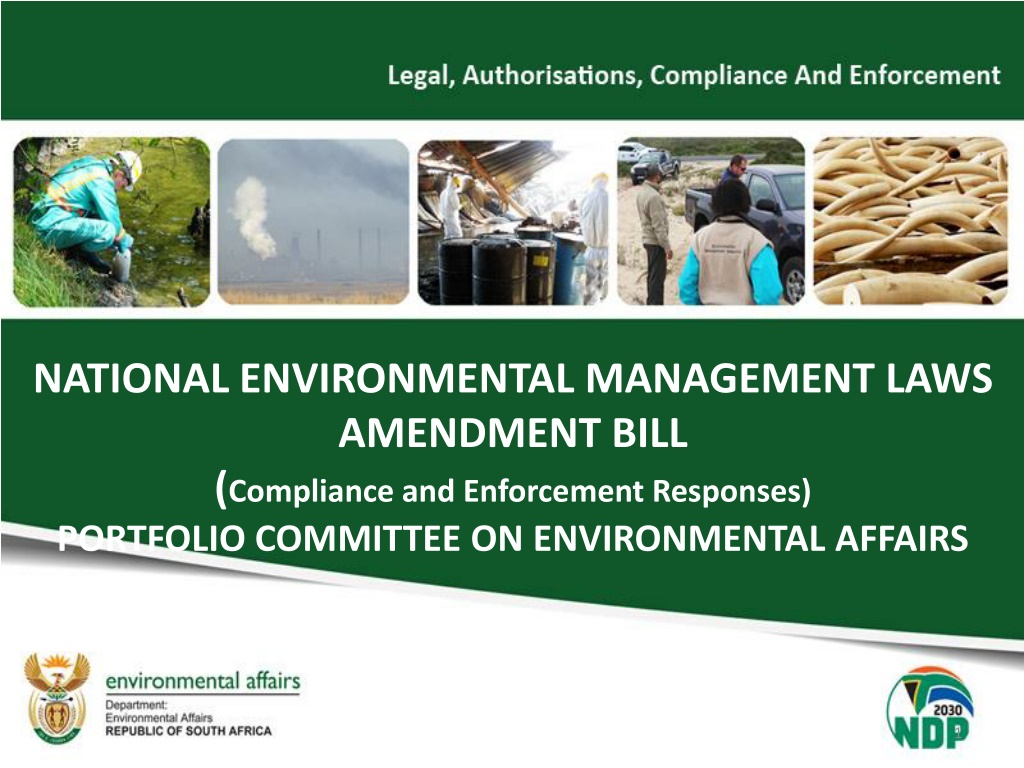

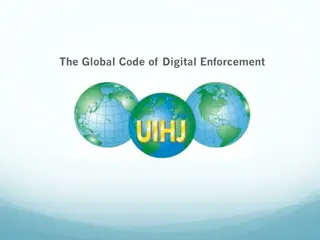
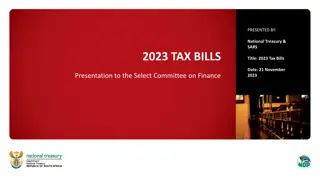
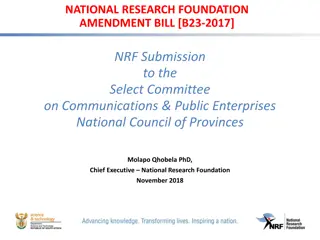
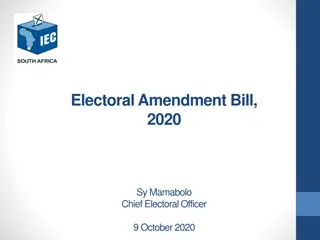

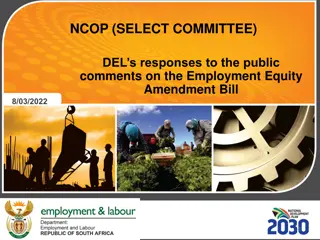
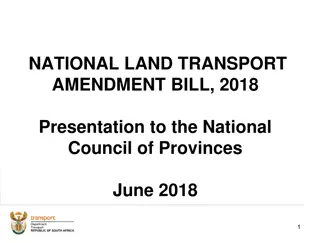

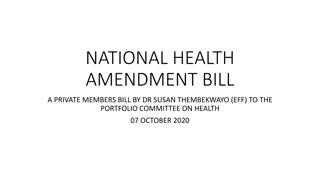
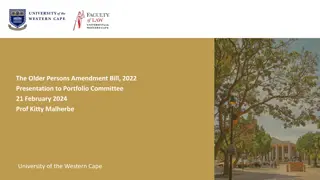
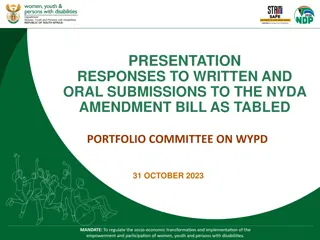
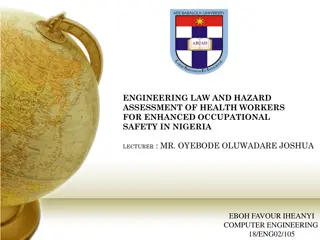
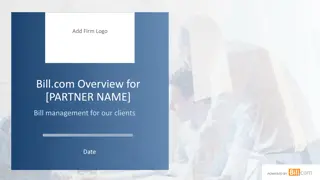
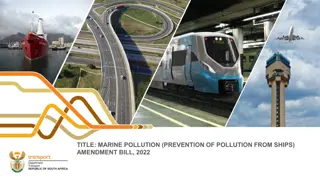
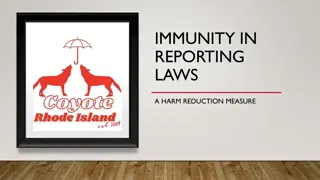
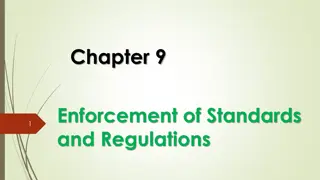

![RE: ELECTORAL MATTERS AMENDMENT BILL [ B42-2023]](/thumb/18837/re-electoral-matters-amendment-bill-b42-2023.jpg)
![Stakeholders' Responses to National Health Insurance Bill [B.11B-2019]: Overview](/thumb/69945/stakeholders-responses-to-national-health-insurance-bill-b-11b-2019-overview.jpg)

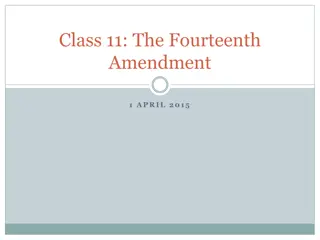
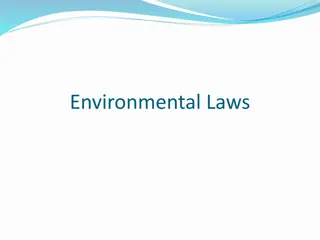
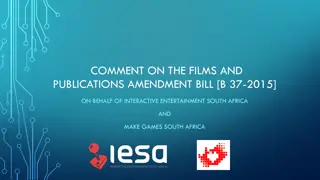
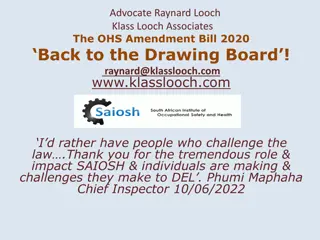
![Briefing on the Criminal Procedure Amendment Bill [B12-2021] to the Portfolio Committee on Justice and Correctional Services](/thumb/157093/briefing-on-the-criminal-procedure-amendment-bill-b12-2021-to-the-portfolio-committee-on-justice-and-correctional-services.jpg)

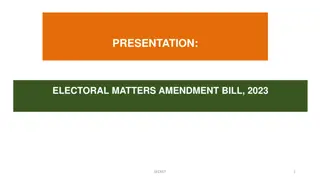
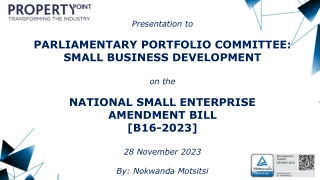
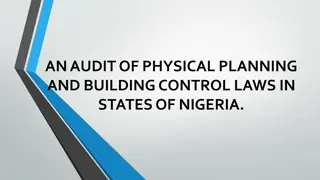
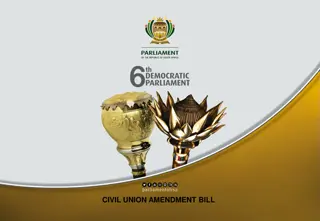



![Enhancing Corporate Transparency: Analysing The Companies Amendment Bill [B27B-2023]](/thumb/60028/enhancing-corporate-transparency-analysing-the-companies-amendment-bill-b27b-2023.jpg)



